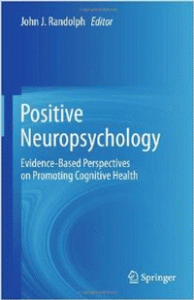Positive Neuropsychology: Evidence-Based Perspectives on Promoting Cognitive Health

“Positive Neuropsychology: Evidence-Based Perspectives on Promoting Cognitive Health”
Edited by John Randolph
Springer
New York, N.Y., 2013
Book introduces new perspective for neuropsychology
Reviewed by Joseph N. Ricciardi, PsyD, ABPP, BCBA-D, CBIS
Is the practice of neuropsychology primarily about documenting deficits or can it include promoting cognitive wellness? This question is posed by neuropsychologist John Randolph, editor and contributing author of “Positive Neuropsychology: Evidence-Based Perspectives on Promoting Cognitive Health.” The book makes the case for an expanded role for neuropsychologists in the promotion of cognitive health and well-being.
As a new development, positive neuropsychology draws on the foundation laid by positive psychology by applying a similar approach to the field of neuropsychology. Where positive psychology focuses on the study and promotion of positive emotion, strength and outlook, positive neuropsychology aims at “the study and promotion of cognitive health” – optimizing cognition through skill development, compensatory strategies, lifestyle change and prevention.
The book’s intent is to orient readers to this new perspective on research and practice. Nine chapters cover a range of important topics to meet this objective. The first chapter provides a definition of positive neuropsychology and through a systematic review of publishing trends across major journals; a case is made for why this should become a focus for researchers and practitioners.
Additional chapters outline the major concerns of a positive approach toward neuropsychology: successful coping with disease, optimizing cognition through lifestyle changes, cognitive wellness in older adults, neuropsychological aspects of leadership and prevention with a special focus on sports concussion.
The focus on cognitive wellness and enhancing strengths is immediately valuable. Consider a client with multiple sclerosis referred for evaluation. During post-testing consultation, areas of decline are discussed and grim questions about the progression of the disease are answered. What happens next? Is the client sent home with a test report? Ideally, the client is given helpful strategies for stress management and coping (Chapter 2), and advisements for sleep, exercise, and nutritional changes that will maximize cognitive functioning during the next few years (Chapter 3).
Perhaps strategies for enhancing executive functioning (Chapter 5) are reviewed and coached during subsequent meetings. While the reality of the disease remains, such an approach would delay advancement of cognitive decline.
A particularly novel chapter (Chapter 8) reviews the use of technology to support independent lifestyles in elderly individuals with cognitive impairments. The research reviewed is all quite recent and emphasize uses of technology with empirical support. The chapter provides an ideal way to “get up to speed” in this rapidly growing and changing domain. No doubt technology will offer wheat and chaff, so the strong empirical orientation is a plus.
My take from the book is that positive neuropsychology is the natural next step for the specialty. While not a neuro-
psychologist myself, I seek neuropsychological consultation and I appreciate this guidance for helping individuals with deteriorating disease or brain injury. Many psychologists will benefit from similar guidance for more typical clients, such as the older person with age-related cognitive decline or the person whose presenting issues are complicated by a lifetime of executive dysfunction.
Positive neuropsychology is clearly in its nascence, so the book is not a collection of prescriptions, though it does offer a pathway. This book will help readers adopt a broader view of what can be offered to clients with numerous presentations. Since we now know that brains are always changing – neurogenesis, dendritic branching, and pruning are lifelong processes – the issue is guiding individuals toward optimization. This direction is an optimistic and hopeful one for the field.
Joseph N. Ricciardi, PsyD, ABPP, BCBA-D, CBIS is assistant vice-president and director of clinical services at Seven Hills NeuroCare.
Learn more about the book: Positive Neuropsychology: Evidence-Based Perspectives on Promoting Cognitive Health
